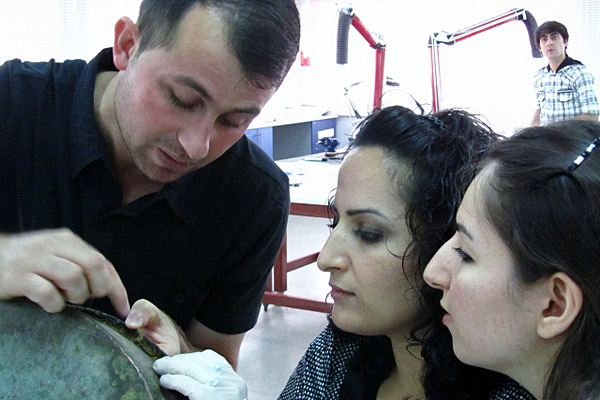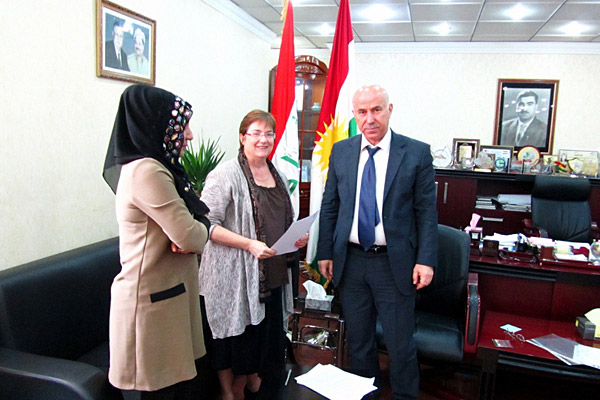


Preserving ancient culture
Iraqi conservation institute receives funding to expand
10:51 a.m., July 9, 2012--The U.S. Department of State's Cultural Heritage Center has awarded $419,000 to expand and strengthen an educational institute in Iraq that is dedicated to preserving the cultural heritage of the world's most ancient civilizations.
The grant awarded in June, which is administered through a partnership led by the University of Delaware, is just the latest financial support for the Iraqi Institute for the Conservation of Antiquities and Heritage (IICAH) in Erbil, Iraq. In the past year, numerous other grants and private donations have been awarded, giving the institute a total of nearly $1.8 million in recent support.
Global Stories
Fulbright awards
Peace Corps plans
"This is a project and partnership for Iraq and the world and one we can all feel very proud of," said Debra Hess Norris, Henry Francis du Pont Chair in Fine Arts and chair of UD's Department of Art Conservation, who helped spearhead the initial plans for the institute. "Very real challenges remain, but we are making a difference for many."
Also in June, Nawzad Hadi, the governor of Erbil, and the University signed a memorandum of understanding in which the governor's office agreed to provide funding to allow the institute to resume its program of architectural and site conservation.
That agreement serves as "a signal of future cooperation between the government of Erbil and the University of Delaware in expanding existing programs and building on the foundation of the IICAH initiatives," said Jonathan Keyser, program director with UD's Institute for Global Studies, which provided support for the project.
The IICAH, founded in 2008, is the only educational institution in Iraq that is training museum, archaeology and architecture preservation professionals in modern preservation techniques. Since the first students arrived in 2009, some 118 professionals from all over Iraq have received training there through classes taught by international experts.
"Iraq's diverse communities share the heritage of the world's oldest civilizations, preserved in buildings, sites and museums across the nation," Jessica S. Johnson, academic director of UD's conservation programs at the institute, said in a recent presentation about the IICAH. Before 1980, she noted, historical sites and artifacts were managed by professionals from the Iraqi State Board of Antiquities and Heritage (SBAH), but decades of sanctions, regime change and war led to fewer staff members and deterioration of Iraq's cultural heritage.
Now, in classes at the institute, heritage professionals are making up for lost time by learning the newest techniques for preserving collections and managing museums and sites. In addition to the regular classes, Iraqi teaching assistants are being groomed to take over the educational programs in the longer term. The students are men and women, Arabs and Kurds, Muslims and Christians, Sunni and Shia, and may come from any province in Iraq.
"IICAH graduates return to work and immediately apply their updated skills — and connections to international peers — to improving the management of Iraqi sites and collections," Johnson wrote, adding that the institute also serves as "a place for reconciliation and cultural understanding."
The institute is managed by a five-member board of directors that was established in 2010 by a memorandum of understanding between the Erbil Governorate and the SBAH. It is guided by an international advisory council that includes members of the SBAH, the Kurdistan regional government, UNESCO, the University of Delaware, Walters Art Museum, Winterthur Museum, University of Arizona, University of Pennsylvania and the Getty Conservation Institute.
Last summer, the institute's directors and two Iraqi advisers, along with many of the U.S. based advisers, visited Delaware to hold meetings and to tour various museums in the mid-Atlantic region and the conservation labs at Winterthur.
And in November, Vice President Joseph Biden and Iraqi Prime Minister Nuri al-Maliki met to reaffirm the Strategic Framework Agreement that the two nations had signed three years earlier and to propose future cooperative efforts, according to a joint statement issued by the White House at the time. Among the collaborations that Iraq sought, the announcement said, were programs "preserving Iraq's rich cultural heritage, especially through assistance in conserving archaeological sites such as the Babylon historical site, which the United States has helped preserve, and through support to the [IICAH]."
Recent grants to the Iraqi Institute
In addition to the new U.S. Department of State award, the IICAH has received recent support from the Andrew W. Mellon Foundation ($400,000), Getty Foundation ($200,000) and the U.S. Embassy in Baghdad ($550,000) for the institute's Conservation and Collection Care Program and the governor of Erbil has made a commitment ($287,000) for the Architectural and Site Conservation Program.
Several donors also have funded scholarships for all eight second-year students and two master trainers to attend classes at the institute. Donations were made by the Leon Levy Foundation, the Linda Noe Laine Foundation in memory of Gov. James Albert Noe, Sr., and Mrs. Anna Gray Noe of Monroe, La., Gouhar Hazim Shemdin and Mrs. Babe Stofer.
Article by Ann Manser
Photos courtesy of Jessica Johnson









